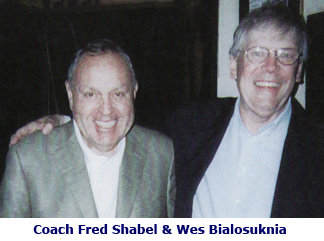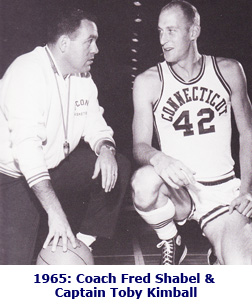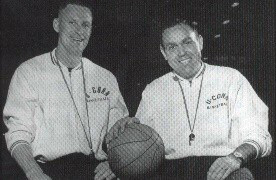Fred Shabel was the Head Coach of the UConn men’s basketball team from
1963 – 1967. He enjoyed 72 wins and only 29 losses during his tenure. I
had the pleasure of talking to Fred in January 2005 about his basketball
experiences as a player, coach, athletic director, and his involvement
today in the sports and entertainment world.
Fred started playing basketball when he was 11 or 12 years old. The kids
went to the school yard where they used metal rectangular backboards with
round holes, attached to a pole or against a brick wall as their baskets.
“I was working for my father in a fruit and vegetable store, and I had a
bicycle with a big basket. I would deliver orders for my father as a young
kid, and I would stop off at the school to play basketball.” Later his
father put a backboard up in the dirt yard behind the vegetable store.
Fred went to Union Hill High School in Union City, New Jersey, and played
on the basketball team with other future New England great players Togo
Palazzi and Tommy Heinsohn from Holy Cross University, and Billy Baird who
played at the University of Rhode Island. “We had a really strong high
school basketball team.” They didn’t win any state championships but they
went to the state tournament a couple of times while Fred was there.
After high school, Fred went to Duke University on a basketball
scholarship. Duke wasn’t the same level of basketball then that it is
today. Fred’s position was a guard, and in those days you could get away
with being a slow guard because teams didn’t use full court pressure. Fred
told me he sat on the bench quite a bit during his sophomore and senior
years but as a junior he started about 14 games. He enjoyed running the
offense and being a play maker.
While Fred was a sophomore, the great Dick Groat (who later became a Major
League Baseball player for the Pittsburgh Pirates and was the National
League Most Valuable Player in 1960), was a senior at Duke, and at the
time, led the nation in scoring. “Dick scored 48 points against the
University of North Carolina in his last home basketball game at Duke. He
was taken out of the game with five seconds left on the clock, and I went
into the game for him. At Cameron Gym, 9,000 people stood up, and gave
Dick a standing ovation. My Russian immigrant father was in the stands,
and thought the ovation was for me. He died at age 90, and I never told
him otherwise.”
 After college Fred played, and coached basketball in the Air Force for two
years. After the Air Force, Fred worked at ESSO Standard Oil Company in
New Jersey for a year until he was contacted by the head coach at Duke to
become an assistant coach there. He knew that Fred had done some coaching
while in the Air Force. “I was never planning to go into coaching. The job
offer was full time, nine months with June – August off when I worked at
summer basketball camps. The pay was equivalent to ESSO Standard Oil pay,
$4,800. annual salary, and I accepted.” After college Fred played, and coached basketball in the Air Force for two
years. After the Air Force, Fred worked at ESSO Standard Oil Company in
New Jersey for a year until he was contacted by the head coach at Duke to
become an assistant coach there. He knew that Fred had done some coaching
while in the Air Force. “I was never planning to go into coaching. The job
offer was full time, nine months with June – August off when I worked at
summer basketball camps. The pay was equivalent to ESSO Standard Oil pay,
$4,800. annual salary, and I accepted.”
Fred held the assistant coach position at Duke for the next six years. In
his sixth year the team made it to the National Collegiate Athletic
Association Tournament Final Four. Just prior to the tournament Fred was
offered a head coaching job at Rutgers University, after the tournament
was over, Fred decided not to accept the position at Rutgers, and would
remain as an assistant at Duke. A little trivia about the Final Four: In
the 1960’s there was a consolation game so if you lost the first game in
the Final Four, you played for third place. Duke was beaten by Loyola of
Chicago who ended up winning the national championship game. Duke played
Oregon in the consolation game and won. Duke had an All American player,
Arthur Heyman, who won Most Valuable Player Honors of the Final Four even
though he didn’t play in the final game. After the Final Four, the
University of Connecticut contacted Fred to become the head basketball
coach. He accepted, and although Rutgers always thought he refused them to
go to CT, it wasn’t true.
The transition from Duke to UConn was significant because UConn had a very
conservative athletic department. It really wasn’t giving out athletic
scholarships. Scholarships were based on a financial-need-only basis, and
the kind of big-time basketball support was not the same as what Fred was
used to at Duke. Fred tried to bring the Duke model to UConn with the
start of the pep band, and he brought entertainment to the games, and
signs, and decorations. UConn was dominating the Yankee Conference, and
Fred was trying to move it to another level. He had positive results. The
first year Fred was at UConn, the team went to the Final Eight in the
National Collegiate Athletic Association Tournament only to get beaten by
Duke.
Some memories while coaching at UConn were of a playoff game against the
University of Rhode Island. Fred and the head coach at Rhode Island had to
meet halfway between Storrs and Rhode Island to flip a coin as to where
the playoff game would be played. Fred remembered a game while he was
coaching when UMass head coach Johnny Orr got mad at some calls, and
started throwing his coat and the student body came out of the stands, and
there was a big fight on the floor. Fred also remembered a game while at
UConn, only a year after leaving Duke. UConn met Duke in the Final Eight
of the NCAA Tournament. Fred said that someone asked him if he had mixed
emotions playing Duke and Fred’s response at the time was, “No, CT pays my
salary”.
Some great players who Fred coached at UConn were Wes Bialosuknia who was
a great shooter in the days before the three point shot, Toby Kimball who
was a great CT player, and went on to play in the National Basketball
Association for several years, and Bill Holowaty was set for a monster
career until his injury. “Bill came from small town USA. I marvel at his
success. The championships that he’s won as the head baseball coach at
Eastern CT State University, and what he has accomplished there.”
 After coaching four years at UConn, Fred decided he wanted to get out of
coaching, and became UConn’s assistant athletic director. After only a few
months, the University of Pennsylvania contacted Fred to become its
Athletic Director. During Fred’s eight years as athletic director at the
University of PA, the basketball team was nationally ranked. Fred had
hired Chuck Daley from Boston College to be the head coach of the
University of Pennsylvania. Chuck Daley later went on to win two National
Basketball Association Championships as coach of the Detroit Pistons. Next
Fred became Vice President of the University of PA for five years. “I left
Penn in 1980, and became the president of the company I’m still with,
Comcast-Spectacor. We own the Philadelphia 76ers basketball team, and the
Philadelphia Flyers. We own the Cable Systems in Philadelphia that the
games are watched on, and we own the Wachovia Center where UConn plays
Villanova when they come to town. I’m the Vice Chairman of Comcast-Spectacor.”
Fred still attends UConn games when UConn men or women are in
Philadelphia, and he watches UConn during the NCAA Tournament. After coaching four years at UConn, Fred decided he wanted to get out of
coaching, and became UConn’s assistant athletic director. After only a few
months, the University of Pennsylvania contacted Fred to become its
Athletic Director. During Fred’s eight years as athletic director at the
University of PA, the basketball team was nationally ranked. Fred had
hired Chuck Daley from Boston College to be the head coach of the
University of Pennsylvania. Chuck Daley later went on to win two National
Basketball Association Championships as coach of the Detroit Pistons. Next
Fred became Vice President of the University of PA for five years. “I left
Penn in 1980, and became the president of the company I’m still with,
Comcast-Spectacor. We own the Philadelphia 76ers basketball team, and the
Philadelphia Flyers. We own the Cable Systems in Philadelphia that the
games are watched on, and we own the Wachovia Center where UConn plays
Villanova when they come to town. I’m the Vice Chairman of Comcast-Spectacor.”
Fred still attends UConn games when UConn men or women are in
Philadelphia, and he watches UConn during the NCAA Tournament.
Fred’s thoughts on Coach Calhoun, “Jim Calhoun, and that whole athletic
department has just brought UConn basketball to the heights that I don’t
think any of us ever would have realized they could do. Coach Calhoun is a
sensational coach.” Fred also said that over the years the athletes have
become stronger, faster and bigger. He doesn’t think the athletes from the
‘60’s compare to the athletes of today, with all due respect.
Fred has been married to his wife, Irene, for 15 years. Irene is a
graduate of Penn Wharton School, and has held professional human resource
and labor relations career positions. Throughout her career Irene was the
Vice President of Human Resources at Princeton University. Fred’s first
child, Lisa was born in CT while Fred was at UConn. Lisa is currently a
professor of philosophy at Ohio State University. Fred’s second child,
Alan, was born in Philadelphia. Alan has a Ph.D. in Paleontology from
Berkeley, California. Alan and his wife Sophie have two children; Gemma and Samuel.
Fred ended our conversation by saying, “Things have really gone well, and
it’s all evolved around sports and entertainment.”

Burr Carlson and head coach Fred Shabel
|
